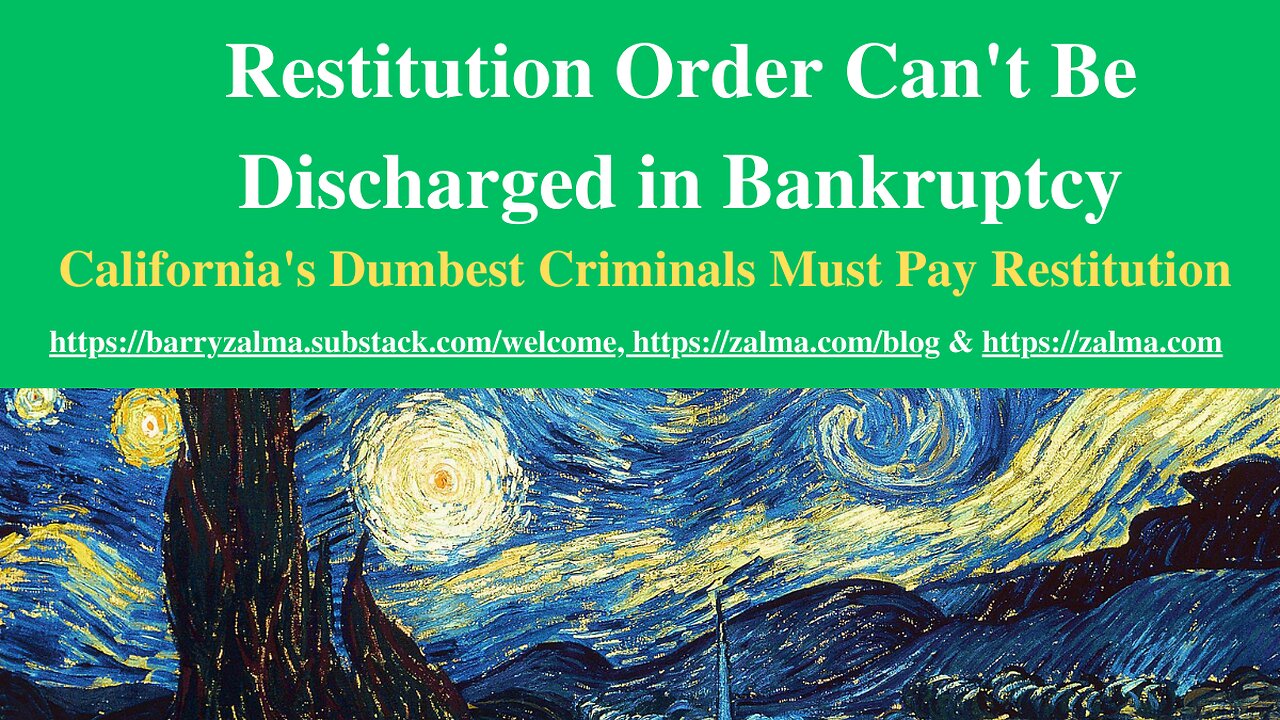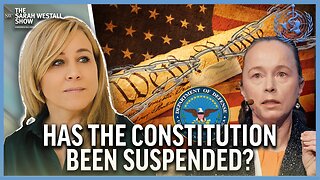Premium Only Content

Restitution Order Can’t Be Discharged in Bankruptcy
California’s Dumbest Criminals Must Pay Restitution
After Frayba Tipton and William Tipton pled guilty to committing insurance fraud, they were ordered to pay victim restitution to Nationwide Insurance Company of America (Nationwide). Nationwide obtained a civil judgment an award of over $1,200,000 in civil litigation against the Tipton’s only to have the judgment discharged in bankruptcy. Nationwide then petitioned the trial court to convert the criminal restitution orders to civil judgments against both defendants. The trial court granted Nationwide’s petition and entered civil judgments against the defendants.
In Nationwide Insurance Company Of America v. Frayba Tipton et al., C095606, California Court of Appeals, Third District, San Joaquin (May 26, 2023) the court agreed that the restitution order could be made collectible as a civil judgment and not subject to discharge in bankruptcy.
BACKGROUND
After a fire destroyed the defendants’ home, they filed an insurance claim in which they overstated losses related to the contents of their home. (People v. Tipton, supra, 3C083065.) Nationwide alleged in court filings that among the overstated losses was the claimed loss of an original Vincent van Gogh “Starry Night” painting which is still safely in a museum. Defendants pled guilty to a felony insurance fraud allegation and no contest to a felony perjury allegation, and the trial court placed them on five years of formal probation. After informing defendants of their right to have a judicial determination of the amount of restitution that would be owed to Nationwide and holding an evidentiary hearing to determine the amount, the trial court ordered defendants to pay $792,597.22 in victim restitution to Nationwide in 2016.
Though defendants were later able to have the award against them discharged in federal bankruptcy proceedings, the order of discharge explained that “debts for most fines, penalties, . . . or criminal restitution obligations” were not discharged.
In 2020, the probation department informed the parties that it would cease its efforts to collect restitution because probation had expired although they should have moved to incarcerate the Tiptons for failure to pay restitution.
The trial court agreed with Nationwide after the hearing and the court entered civil judgments against each defendant in favor of Nationwide for over $1,000,000 (accounting for the outstanding unpaid restitution, plus 10 percent annual interest).
DISCUSSION
California law provides: “In every case in which a victim has suffered economic loss as a result of the defendant’s conduct, the court shall require that the defendant make restitution to the victim.” (§ 1202.4, subd. (f).) A trial court must order full restitution. A restitution order imposed pursuant to section 1202.4, subdivision (f) is enforceable “as if” it was a civil judgment and is enforceable in the same manner as is provided for the enforcement of any other money judgment.
As made clear on the criminal order of restitution used in criminal cases Penal Code section 1214 provides that once a dollar amount of restitution has been ordered, the order is then enforceable as if it were, and in the same manner as, a civil judgment.
The Victims’ Bill of Rights Act of 2008, known as “Marsy’s Law,” amended article I, section 28 of the California Constitution by expanding and constitutionalizing the protection of victims’ rights, including the right to restitution. (See People v. Gross (2015) 238 Cal.App.4th 1313, 1317.)
A victim’s constitutional right to restitution cannot be bargained away or limited, nor can the prosecution waive it. Victims are first in line to receive any money collected from criminal defendants ordered to pay restitution. Because the California Constitution guarantees crime victims the right to restitution and that right is given a broad and liberal construction and statutes regarding the right should be construed in the context of the relevant statutory scheme.
ANALYSIS
The Court of Appeals concluded that the trial court did not err when it converted the restitution orders as it clearly had authority to deem them money judgments pursuant to section 1214, subdivision (b) and properly did so.
While enforceable as if it were a civil judgment, a restitution order “is not a civil judgment” and the victim restitution statutes demonstrate legislative recognition of the distinct and separate right of a victim to pursue a civil remedy irrespective of the restitution order
The plain language of section 1214 equates a restitution order to a civil judgment and articulates how such orders can be enforced within the criminal courts, but if a civil court is asked to convert such a restitution order into a civil judgment, as in the case here, it is not error for it to do so.
The judgments are affirmed.
ZALMA OPINION
To claim that they lost the original Vincent van Gogh painting “Starry Night” was stupid enough since it is located in the Museum of Modern Art in New York and has been there for many years, should have made the fraud claim easy for Nationwide to prove and makes understandable the civil judgment and the restitution order. Even though they discharged the civil judgment in bankruptcy they could not discharge the restitution order. Nationwide can now collect over $1 million from any assets the Tipton’s have. They violated the terms of their probation by not paying restitution and should have been put in jail. The Tipton’s should consider their freedom from jail a lucky award.
(c) 2023 Barry Zalma & ClaimSchool, Inc.
Subscribe and receive videos limited to subscribers of Excellence in Claims Handling at locals.com https://zalmaoninsurance.locals.com/subscribe.
Consider subscribing to my publications at substack at https://barryzalma.substack.com/publish/post/107007808
A ClaimSchool™ Publication © 2023
Barry Zalma & ClaimSchool, Inc., Go to my blog & Videos at: Zalma on Insurance, at https://zalma.com/blog, Go to the Insurance Claims Library, Listen to the Podcast: Zalma on Insurance, Videos from Zalma on Insurance, Subscribe to Barry Zalma on Substack.com, Go to Newsbreak.com https://www.newsbreak.com/@c/1653419?s=01, Subscribe to the e-mail Version of ZIFL, it’s Free! Read the last two issues of ZIFL here, Go to the Barry Zalma, Inc. web site here, Videos from “Barry Zalma on YouTube,” videos at Rumble.com at https://rumble.com/zalma, @Zalma on Truth Social; Follow me on LinkedIn here.
-
 7:40
7:40
Barry Zalma, Inc. on Insurance Law
1 year agoLoss of Inventory by Bankruptcy
166 -
 LIVE
LIVE
Space Ice
4 hours agoSpace Ice & Redeye: Van Damme's The Quest: Pirates, Clowns, James Bond & Bloodsport
284 watching -
 LIVE
LIVE
The StoneZONE with Roger Stone
2 hours agoJ6 Martyr Enrique Tarrio Describes Inhumane Prison Conditions Ordered by Biden | The StoneZONE
802 watching -
 16:48
16:48
Tundra Tactical
1 hour agoAffordable Medical Gear From ACETAC SHOT Show 2025
311 -
 1:46:16
1:46:16
Redacted News
4 hours agoRFK CONFIRMATION: Kennedy goes to WAR with Big Pharma Democrats in Fiery Hearing | Redacted Live
106K271 -
 57:31
57:31
Candace Show Podcast
5 hours agoBREAKING! Taylor Swift Turns Against Blake Lively & Ryan Reynolds | Candace Ep 141
126K162 -
 1:04:59
1:04:59
Sarah Westall
2 hours agoRFK Jr Report, Constitution Suspended, War Time Procedures in Place, WHO Exit, DOD w/ Sasha Latypova
4.93K3 -
 1:56:37
1:56:37
Melonie Mac
6 hours agoGo Boom Live Ep 35!
20.2K9 -
 1:01:13
1:01:13
LFA TV
9 hours agoPRESIDENT TRUMP SIGNS LAKEN RILEY ACT | BASED AMERICA 1.29.25 6pm
25.8K4 -
 LIVE
LIVE
2 MIKES LIVE
3 hours ago2 MIKES LIVE #172 News Breakdown Wednesday!
222 watching